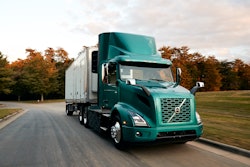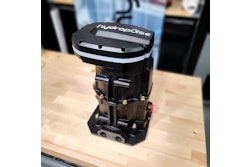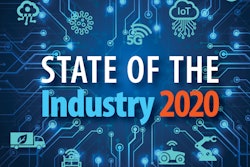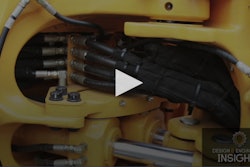
responses submitted by Michael Terzo, CEO, Terzo Power Systems, LLC
Global Markets, Government & Trade
What are the key global markets your company sees as growth opportunities and why?
Medium- and Heavy-duty trucking: Electrification is taking hold of all aspects of transportation. While it might seem to be coming out of nowhere, all the recent activity in the MD/HD space has been going on behind the scenes for quite a few years; we are just seeing the acceleration as OEMs get closer to their start of production dates over the next 2-5 years. Of course, the recent announcement by California of their Advanced Clean Truck rule has brought this activity into the spotlight. This rule by the California Air Resources Board (CARB) requires OEMs to increase their ZEV (zero-emission vehicle) truck sales beginning in 2024 to 40-70% by 2035. The impact of this rule will have long lasting impacts on the trucking industry.
Diesel, Electric & Other Power Alternatives
What opportunities for technology and efficiency advancements still exist with diesel engines?
The major opportunities we see for diesel engines is in hybrid systems where the duty cycle of the application still is a difficult proposition for pure electric. Hybrid systems for off-highway equipment provides some incredible advantages for OEMs in terms of performance, fuel efficiency, controllability, and flexibility. What this means to the engine manufacturers is a growth in smaller engine platforms, specifically those engine platforms that work well with a hybrid architecture. A fully decoupled hybrid system utilizes constant speed engines with the best efficiency band while still providing flexibility in integration. We have already seen about a 50% engine size reduction across the board in every hybrid design we have done. So, while there will still be a significant market for diesel engines over the next decade, the types and sizes of these engines will change. Unfortunately, a hybrid system does not necessarily need the torque (one of the biggest advantages of a diesel versus gas) since we can match the output of an engine to the permanent magnet motor generator. This opens the door for other fuel types; so diesel manufacturers who also provide multiple fuel engines will see increasing growth.
How does your company see alternative fuels playing a role in the heavy equipment industry in the coming years?
As I mention above, alternative fuels will see gains in the heavy equipment industry in the coming years, but the biggest winner might be gasoline. A hybrid system can utilize a gasoline engine just as easily as a diesel engine. Engine manufacturers are producing gasoline versions of their diesel platforms that are just as durable and reliable as the diesel variant and they have the advantage of better cold weather starting and altitude performance. Gasoline also does not have the same health concerns with emissions as diesel, which is why I believe we will see a larger conversion of diesel-to-gas versus diesel-to-electric in many constant duty cycle applications.
What role is electrification—or other alternative energy/power systems—playing in your company’s design initiatives?
Well, since our entire mission is to develop and manufacture the best electrohydraulic solutions for OEMs it’s a pretty big role! While we believe the entire power system for every off-highway vehicle will be fully electric (either via battery, fuel cell, hybridization or a combo of these) over the coming decades, electrification has already permeated every aspect of the off-highway industry and in many instances, it is not for the reasons that many people believe. We can electrify parts of a system that provide early return on fuel savings or maintenance such as operating a clutch with an electrohydraulic pump versus pulling that circuit off the main hydraulic system. This provides a power-on-demand aspect that would have robbed a lot of efficiency and provided wear and tear issues in a conventional system.
Are there any emissions or other related regulations your company is monitoring, or feel will have an impact on design efforts and the industry?
Our location in California allows us to be acutely tuned into the regulations that are both already in effect and being proposed. We work closely with CARB and other agencies to both understand the regulatory environment and also to provide critical industry feedback whenever possible. I also am on the Board of Directors for the California Mobility Center which has as one of its missions to provide a roadmap for vehicle OEMs to navigate the complex regulatory and policymaking landscape. We see that the new ZEPC (Zero-Emission Powertrain Certification) process will help OEMs significantly by combining the different rules for on- and off-highway powertrain certification into one cohesive set of guidelines and regulations. We also believe that the Advanced Clean Truck rule that was recently announced will be the framework for similar off-highway ruling.
Listen to our podcast interview with Michael Terzo for more of his insights on electrification of off-highway equipment.
Data, IoT & Connectivity
How will the role of the Internet of Things (IoT) and data continue to progress in the coming years?
While these are big areas of interest and growth in the off-highway industry, I see that we might not see the true impacts of these areas until we are further down the electrification path. Once you electrify your system, IOT, data and connectivity become much more interesting and powerful for a whole number of reasons. Big Data can allow improved motion control, efficiency, and performance but those benefits are difficult to pencil out with a traditional ICE (internal combustion engine) system. A hybrid or electric system is a different story. I see that electrification will truly enable an explosion in the data, IOT, and connectivity fields, but that might not be started quite yet.
Do you see a path toward the use of artificial intelligence, virtual reality or augmented reality in your manufacturing processes, or even on-board the vehicle itself?
Absolutely. There are some stunningly great use cases for this right now. For example, the recent system by a European company for logging trucks. This VR system allows the driver to remain in the heated or cooled cab of a logging truck and operate the grapple crane via VR goggles. Loading his trailer full of logs without having to be exposed to the elements is just one great example of VR that is coming out. The other amazing application is safety related. Many off-highway vehicles operate in dangerous conditions and VR/AR will allow these jobs to be done in a safer manner.
How do you see connectivity and machine learning changing the vehicle landscape in the next decade?
Machine learning is very misunderstood and, in my view, might very well be one of the most significant and greatest opportunities for disruptive change our industry has ever seen. It is in a tie for first place with electrification for what will be explosive growth and potential for the companies that fully understand its benefits, and more importantly, how to apply and integrate this technology.
What challenges remain or lay ahead for the continued adoption of data, IoT and connectivity related technologies or systems?
As I mention above, the true growth of these sectors is just beginning. The largest challenge (which is also the opportunity for those who harness the technology) will be to understand how our industry can easily digest and absorb these new technologies without requiring significant education and/or inconvenience. We all hear how “old school” and “resistant to change” our industry is, but I don’t believe that is the case when you present the technology the correct way to off-highway stakeholders such as OEMs, designers, and executives.
Automation & Smart Systems
What impacts are you seeing automation playing on the heavy equipment and vehicle industries?
Right behind electrification and machine learning will be automation. Automation will completely take over the off-highway world. Mostly this will be done behind the scenes and most people will not even realize how much it has impacted the vehicle they own. I am not talking about “autonomous” systems, I am talking about “automated” systems, and they will dominate the market in 10-15 years.
What is needed to further progress equipment and vehicle automation?
Electrification is needed to truly reap the rewards of automation on vehicle platforms. Our highly complex and difficult to maintain hydraulic systems are not great candidates for automation due to the high degree of skills needed to design and integrate automation into a modern fluid power system. But electrification is changing that, and quickly. Electrohydraulics allow for simple, advanced, and powerful motion control that lends itself well to automation. So, as we see electrification taking hold, we will also see the proliferation of automated systems….Get ready.
How do you see inclusion and development of telematics systems continuing to progress in the 5-10 years?
I see this as basically a “baked-in” component of nearly every vehicle that has a sale price over $10k. It will be ubiquitous and invisible on most equipment, just as it is in passenger cars. Almost every single car nowadays is reporting data back to the OEMs whether you want it to or not.
What do you see as the “next big thing” in automation and smart systems?
Machine Learning!
READ MORE: State of the Industry 2020
Challenges & Opportunities
What are the biggest challenges facing the industry currently, or do you see the industry facing in the coming years?
The biggest challenge will be to attract the high caliber of people that will be needed to deal with the explosive growth of technology sectors that are not common today in the off-highway industry. We will need more electrical engineers, programmers, and back-office technical support than ever before. Already, my company has more engineers than any other position, and electrical and mechanical engineers are neck and neck. This was not true even 5 years ago.
What are some of the biggest opportunities you see in the industry?
Without a doubt most people see that electrification is the biggest opportunity, but hidden in the electrification fervor are amazing gold nuggets of growth in niche technologies that most “off-highway” industry veterans have never even heard about. Remember “fuzzy logic” from back in the 90’s? Well, that will be a role in the future of our industry. Also, robotics are basically foreign to the off-highway world but that will also change quickly. Robotic learning and programming will be a normal point of conversation at off-highway tradeshows in 5-10 years, take my word for it...well at least if this techno-hydraulic nerd has anything to do with it!
Are there any technologies or trends which you are currently excited about in the heavy-duty vehicle industry, or most looking forward to seeing in the coming years?
Motion control. The cross-over from industrial robotics will provide new levels of motion control in the heavy-duty, off-highway vehicle market, and it will be fun!




















